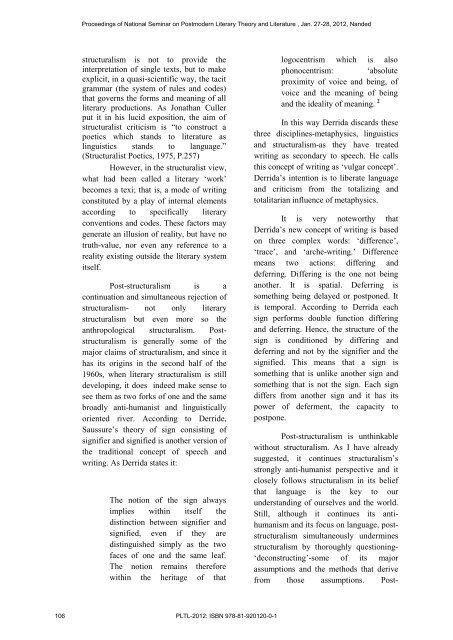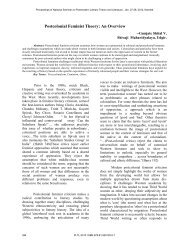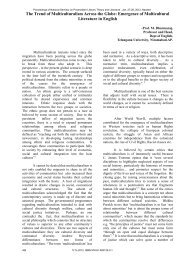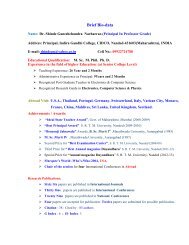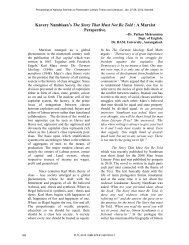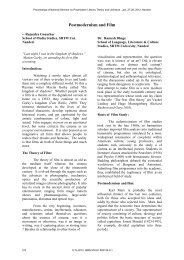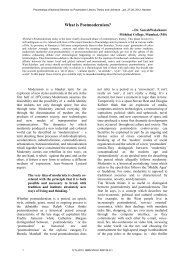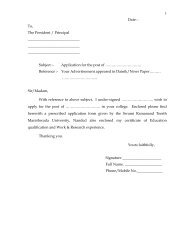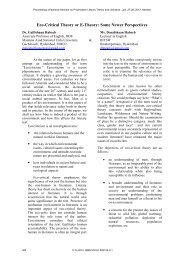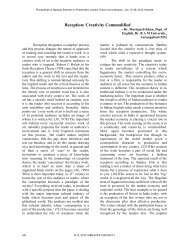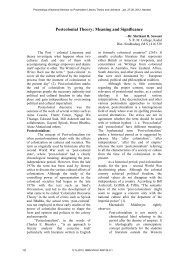Post-Structuralism: An Indian Preview - Igcollege.org
Post-Structuralism: An Indian Preview - Igcollege.org
Post-Structuralism: An Indian Preview - Igcollege.org
You also want an ePaper? Increase the reach of your titles
YUMPU automatically turns print PDFs into web optimized ePapers that Google loves.
Proceedings of National Seminar on <strong>Post</strong>modern Literary Theory and Literature , Jan. 27-28, 2012, Nanded<br />
structuralism is not to provide the<br />
interpretation of single texts, but to make<br />
explicit, in a quasi-scientific way, the tacit<br />
grammar (the system of rules and codes)<br />
that governs the forms and meaning of all<br />
literary productions. As Jonathan Culler<br />
put it in his lucid exposition, the aim of<br />
structuralist criticism is “to construct a<br />
poetics which stands to literature as<br />
linguistics stands to language.”<br />
(Structuralist Poetics, 1975, P.257)<br />
However, in the structuralist view,<br />
what had been called a literary ‘work’<br />
becomes a texi; that is, a mode of writing<br />
constituted by a play of internal elements<br />
according to specifically literary<br />
conventions and codes. These factors may<br />
generate an illusion of reality, but have no<br />
truth-value, nor even any reference to a<br />
reality existing outside the literary system<br />
itself.<br />
<strong>Post</strong>-structuralism is a<br />
continuation and simultaneous rejection of<br />
structuralism- not only literary<br />
structuralism but even more so the<br />
anthropological structuralism. <strong>Post</strong>structuralism<br />
is generally some of the<br />
major claims of structuralism, and since it<br />
has its origins in the second half of the<br />
1960s, when literary structuralism is still<br />
developing, it does indeed make sense to<br />
see them as two forks of one and the same<br />
broadly anti-humanist and linguistically<br />
oriented river. According to Derride,<br />
Saussure’s theory of sign consisting of<br />
signifier and signified is another version of<br />
the traditional concept of speech and<br />
writing. As Derrida states it:<br />
The notion of the sign always<br />
implies within itself the<br />
distinction between signifier and<br />
signified, even if they are<br />
distinguished simply as the two<br />
faces of one and the same leaf.<br />
The notion remains therefore<br />
within the heritage of that<br />
logocentrism which is also<br />
phonocentrism: ‘absolute<br />
proximity of voice and being, of<br />
voice and the meaning of being<br />
and the ideality of meaning. 2<br />
In this way Derrida discards these<br />
three disciplines-metaphysics, linguistics<br />
and structuralism-as they have treated<br />
writing as secondary to speech. He calls<br />
this concept of writing as ‘vulgar concept’.<br />
Derrida’s intention is to liberate language<br />
and criticism from the totalizing and<br />
totalitarian influence of metaphysics.<br />
It is very noteworthy that<br />
Derrida’s new concept of writing is based<br />
on three complex words: ‘difference’,<br />
‘trace’, and ‘arche-writing.’ Difference<br />
means two actions: differing and<br />
deferring. Differing is the one not being<br />
another. It is spatial. Deferring is<br />
something being delayed or postponed. It<br />
is temporal. According to Derrida each<br />
sign performs double function differing<br />
and deferring. Hence, the structure of the<br />
sign is conditioned by differing and<br />
deferring and not by the signifier and the<br />
signified. This means that a sign is<br />
something that is unlike another sign and<br />
something that is not the sign. Each sign<br />
differs from another sign and it has its<br />
power of deferment, the capacity to<br />
postpone.<br />
<strong>Post</strong>-structuralism is unthinkable<br />
without structuralism. As I have already<br />
suggested, it continues structuralism’s<br />
strongly anti-humanist perspective and it<br />
closely follows structuralism in its belief<br />
that language is the key to our<br />
understanding of ourselves and the world.<br />
Still, although it continues its antihumanism<br />
and its focus on language, poststructuralism<br />
simultaneously undermines<br />
structuralism by thoroughly questioning-<br />
‘deconstructing’-some of its major<br />
assumptions and the methods that derive<br />
from those assumptions. <strong>Post</strong>-<br />
106 PLTL-2012: ISBN 978-81-920120-0-1


